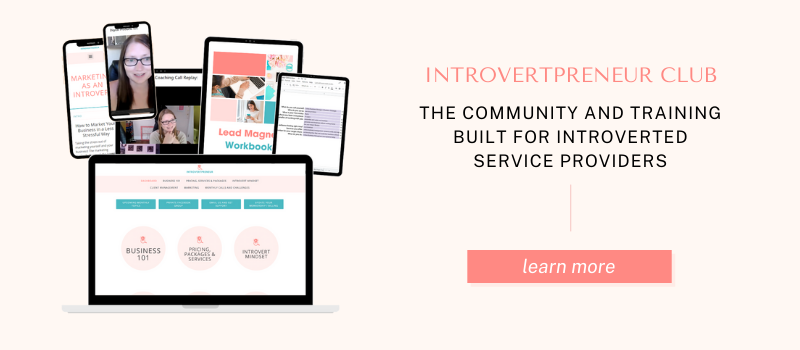Struggling to get the results you want from your emails?
Discover 15 simple yet powerful ways to elevate your email marketing and start seeing real engagement!
Grab your freebie!
Blog Categories
Helping small business owners, virtual assistants, and creative entrepreneurs grow their business.
Hi, I'm Tara! I'm a multi-passionate business and marketing coach.
learn more + get a copy:
Last Updated on October 13, 2025 by Tara Reid
Business owners and CEOs, especially introverted ones, can find themselves surrounded by people eager to offer advice and even more keen to be recognized as the guru responsible for that brilliant new idea or insight. The truth is that there’s a lot of misinformation about introverted entrepreneurs and CEOs, both in general and when it comes to operating an organization. If you’re an introverted business owner or plan to become one in the future, you must understand two primary aspects of your personality before getting started.
Disclaimer: I earn from qualifying purchases. Some of the links on my website are affiliate links, which means, at no additional cost to you, I will earn a small commission if you click through and make a purchase.
First, our Extroversion vs Introversion type will probably not work well in an office environment or as part of a team. Second, operating a business isn’t always going to be easy for anyone, regardless of personality type, but being aware and prepared for some of the specific challenges facing your personality can make things much easier on you than they might otherwise be.

What is the definition of an Introvert?
The definition of an introvert varies, but it generally refers to a person who prefers less social time and more time alone or with small groups of people.
Myth 1: Introverts Don’t Take Risks
We tend to think that introverted people are risk-averse, but the truth is this isn’t always the case. Introverts can be creative and daring at times, but they choose to put their thoughts into action in a different way. They may hold off on making a decision until they have gathered more information before acting, or they may be more likely to come up with an idea and then use it as a catalyst for planning how they will move forward.
Myth 2: Introverts Don’t Know How to Sell
People who work in a business environment are expected to be able to connect and communicate with people on a professional level. However, introverts often struggle with this type of interpersonal communication, especially when asked to promote or sell their products or services. This myth is one that many introverted entrepreneurs and CEOs have had to face at some point in their careers, but there are ways you can overcome this hurdle if you want to succeed in your industry.
First, take a breath and relax before going to any meeting or presentation. Introverted entrepreneurs and CEOs often put too much pressure on themselves up front. It would be best if you got into the habit of taking care of yourself physically before you go into any meeting, as well as mentally.
If you feel like you don’t know what to say or how to express yourself during presentations, it’s likely because you’re not relaxed enough beforehand. When introverted entrepreneurs and CEOs are more relaxed before going into meetings, they tend to be much more confident about what they have to say and how they express themselves during those meetings.
Next, surround yourself with people who support your efforts and help carry your load while also helping you stay grounded. Fortunately for introverted entrepreneurs and CEOs, plenty of people out there would love nothing more than the chance to help an entrepreneur reach their goals–if only they knew that the entrepreneur was introverted! These types of mentors can make all the difference.
Myth 3: Introverts Can’t Successfully Lead a Team
A lot of the advice about introversion and leadership often mistakenly assumes that the combination of these two personality traits makes you incapable of being successful as a leader. That’s a big misconception, and it’s something that introverted leaders like Elon Musk, Sheryl Sandberg, and Steve Jobs disprove daily.
You want to make sure you understand that if you’re an introverted leader, your strengths lie in many different areas, including strategy development, creativity, and innovation. And because those talents are crucial for your business, it’s essential to find ways to leverage them to benefit your company rather than hold it back.
Many introverted leaders have found success by turning their strengths into strengths for their companies instead of trying to hide them or adapt them into non-introvert qualities.
For example, suppose you’re an introvert who is excellent at developing strategies with data analytics and creating creative marketing campaigns. In that case, you might oversee marketing while someone else takes charge of the strategy development process. Or, if you’re an introvert who loves solving problems through creative problem-solving tactics like brainstorming or ideation sessions, you might spend more time working on strategic planning or interior design than public speaking or networking events.
No matter what specific skill sets your personality has given you to help your business succeed, understanding how they work together can make all the difference for your organization.
Myth 4: Introverts Don’t Like to Socialize
Introverts aren’t against social interaction. They just find it challenging to engage in large amounts of it.
Yes, introverts are more likely to enjoy being around one-on-one interactions with a small group of friends or family members. However, they can also be sociable and friendly when the situation calls for it, such as at networking events or at work. In fact, some people are more extroverted than others, so not everyone will be an introvert, while others will be introverts in the future.

Why these myths are limiting and how to break free of them
In many cases, introverted entrepreneurs and CEOs are thought of as less capable than those who are more assertive and outgoing. Some myths even say introverts cannot lead because they lack the charisma and energy of extroverts. The truth is that these myths can be limiting for people with a particular personality type and should be considered false.
For example, there’s a myth that says introverted entrepreneurs cannot work well in an office or on a team, but this isn’t true for everyone who is introverted. Many introverts prefer to focus on their own tasks and work independently from other employees. However, in today’s business world, where you need to collaborate with coworkers to get things done, managing an office staff requires just as much skill as managing clientele or customers. It’s not a question of how to channel your energy; it’s just a matter of understanding your strengths so you can adjust accordingly.
Final Thoughts
The number one myth about introverted entrepreneurs is that they don’t listen. They don’t process information and input the same way as their extroverted counterparts.
Tara Reid is a multi-passionate business and marketing strategist for introverted entrepreneurs who want to grow without relying on hustle culture or social media. With 18+ years of online business experience, she helps course creators, service providers, and digital product sellers build sustainable businesses through evergreen marketing, blogging, SEO, Pinterest, and email.
As the founder of the Introvertpreneur Club, Tara’s mission is to show heart-centered entrepreneurs that you don’t have to be loud to be successful. You just need the right strategies that fit your personality.
When she’s not supporting clients or creating new resources, you can find her at home in Canada with her three rescue dogs, a cup of coffee in hand, dreaming up her next project.
The Introvertpreneur Podcast
listen in to the top rated business podcast that is designed for introverted entrepreneurs who want to grow + scale in a more sustainable and fun way!
Top rated podcast
This one's on me. Complimentary free stuff coming right up.
leaving so soon?
Look behind the curtain and see exactly what I do every week, month, and quarter, to market my business without social media (in under 5 hours per week)!
The Quiet Marketing Playbook
Take this free quiz and learn what your superpower is as an entrepreneur. You'll also get a curated list of my best resources and tips for using your superpower to your advantage!
What's your Introverted Superpower?
Best Free Resources:
dig into 'em now!
A business strategist and marketing coach who focuses on helping course creators, coaches, and service providers, build sustainable businesses without social media.

